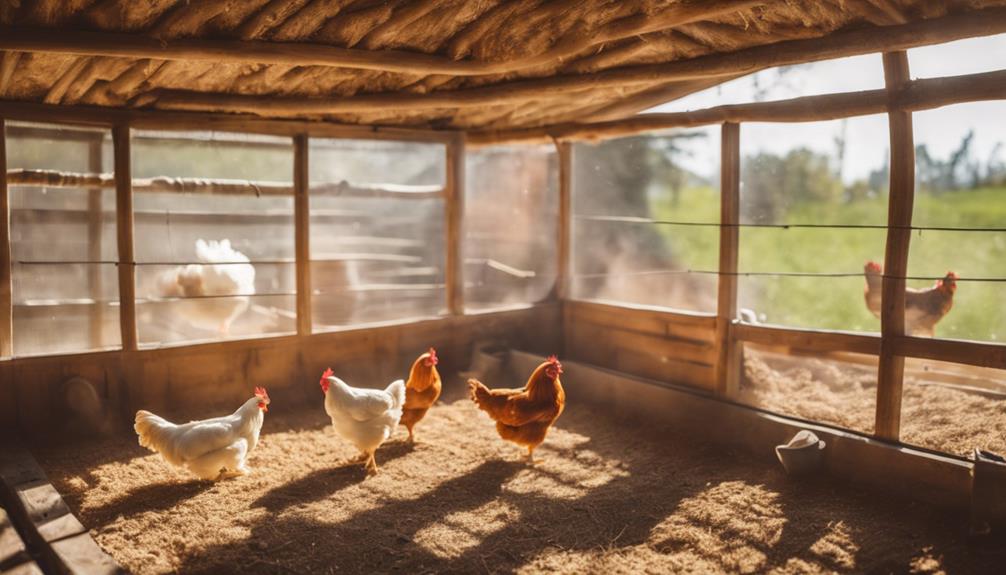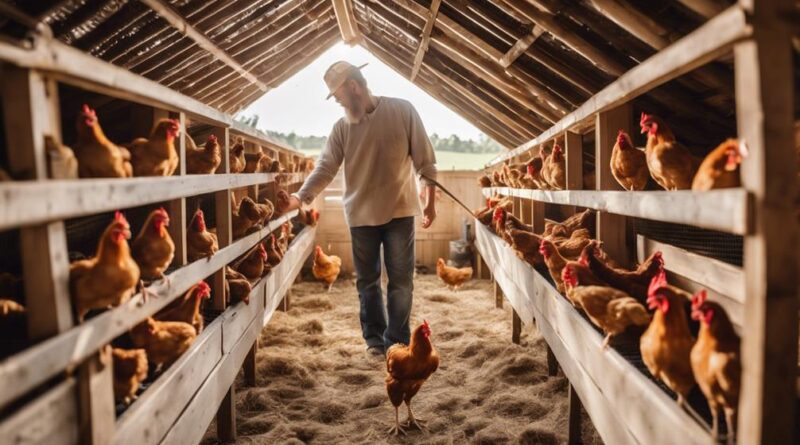How-To Guide: Addressing Humane Treatment in Chicken Farming"
Addressing humane treatment in chicken farming is vital for their well-being. Ensure proper training for handling chickens with care. Use enriching strategies like perches and outdoor access to reduce stress. Implement welfare standards with regular assessments and effective healthcare protocols. Create comfortable housing conditions with good ventilation and space. Monitor their health daily and seek professional advice when needed. Minimize stress factors by maintaining good air quality and reducing noise levels. Educate farm staff on chicken behavior and gentle handling. By following these practices, you prioritize the welfare of chickens and contribute to a more ethical farming environment.
The Importance of Humane Treatment
Ensuring the humane treatment of chickens in farming operations isn't just a moral obligation but also a critical aspect of sustainable and ethical food production. Consumer awareness plays a vital role in driving change within industry practices. When consumers demand higher standards for animal welfare, it puts pressure on farmers and companies to adopt more humane practices. This shift not only benefits the chickens but also aligns with ethical values that many consumers hold dear.
Industry practices have historically faced ethical dilemmas when it comes to the treatment of chickens. Issues such as overcrowding, lack of access to natural light, and the use of antibiotics have raised concerns about animal welfare. By raising awareness and advocating for better treatment of chickens, consumers are actively participating in the push for more ethical farming practices. It's crucial for consumers to be informed about where their food comes from and to support companies that prioritize animal welfare.
Common Ethical Concerns
Addressing the common ethical concerns surrounding chicken farming requires a deep understanding of the industry practices and their impact on animal welfare. Ethical considerations in chicken farming revolve around ensuring the well-being of the birds throughout their lives. One of the primary concerns is the overcrowded living conditions in many conventional chicken farms. Chickens are often raised in cramped spaces, leading to stress, injuries, and an inability to engage in natural behaviors such as dust bathing and perching. This compromises their animal welfare and quality of life.
Another ethical consideration is the practice of debeaking, which is often done without pain relief. Debeaking is performed to prevent aggressive pecking in crowded conditions, but the procedure can cause acute and chronic pain for the birds. Additionally, the fast growth rate of chickens bred for meat production raises concerns about their welfare. These birds can experience skeletal issues and heart problems due to their accelerated growth, impacting their quality of life.
It is essential for chicken farmers to address these ethical concerns by adopting practices that prioritize animal welfare. Providing ample space, enriching environments, and access to natural behaviors can significantly improve the lives of chickens raised for meat and eggs. By considering ethical considerations and prioritizing animal welfare, the chicken farming industry can move towards more compassionate and sustainable practices.
Best Practices for Handling
Implementing best practices for handling chickens on farms is crucial for promoting their well-being and reducing stress levels. Proper training techniques are essential for farm staff to handle chickens with care and efficiency. Regular training sessions that focus on gentle handling methods, understanding chicken behavior, and recognizing signs of distress can significantly improve the welfare of the birds.
Effective staff communication is key to ensuring that all team members are on the same page when it comes to handling procedures. Clear guidelines should be established, and open communication channels should be maintained to address any concerns or issues that may arise. By fostering a culture of respect and empathy towards the chickens, staff members can work together harmoniously to provide the best care possible.
In addition to training and communication, implementing behavioral enrichment strategies can help reduce stress levels in chickens. Enrichment activities such as providing perches, pecking objects, and access to the outdoors can promote natural behaviors and mental stimulation, leading to healthier and happier birds.
Implementing Welfare Standards
To improve the overall welfare of chickens on farms, setting clear welfare standards is key to ensuring their health and happiness. Implementing welfare standards involves various crucial steps that can significantly impact the well-being of the chickens:
- Welfare Assessment: Conducting regular welfare assessments is essential to identify any issues or areas for improvement in the chickens' living conditions. This involves observing their health, behavior, and overall quality of life.
- Behavior Monitoring: Monitoring the behavior of chickens is a vital aspect of ensuring their welfare. By observing their interactions, movement patterns, and response to stimuli, farmers can gain valuable insights into their mental and emotional well-being.
- Nutritional Requirements: Ensuring that chickens receive proper nutrition is fundamental to their welfare. Providing a balanced diet tailored to their specific needs can prevent health problems and promote overall health.
- Healthcare Protocols: Implementing effective healthcare protocols, such as regular check-ups, vaccinations, and prompt treatment of illnesses, is essential for maintaining the welfare of chickens. Early detection and intervention can prevent suffering and improve their quality of life.
Ensuring Proper Housing Conditions
Proper housing conditions play a crucial role in ensuring the well-being of chickens on farms. Ventilation systems are essential to maintain good air quality and regulate temperature inside the chicken coop. Adequate airflow helps prevent the buildup of harmful gases like ammonia, ensuring a healthier environment for the chickens.
When considering flooring options, prioritize surfaces that are comfortable for the birds to walk on, easy to clean, and provide good traction to prevent injuries.
Natural lighting is another key aspect of chicken housing. Exposure to natural light helps regulate the chickens' circadian rhythms, promoting better sleep patterns and overall health. Access to sunlight also aids in vitamin D production, crucial for strong bones and immune function.
Additionally, chickens need sufficient space to exhibit natural behaviors and reduce stress. Providing enough room for the birds to move around freely, perch, dust bathe, and forage is vital for their welfare.
When designing chicken housing, ensure that ventilation systems are in place, choose appropriate flooring options, maximize natural lighting, and meet space requirements to create a comfortable and healthy environment for the chickens. Prioritizing these factors will contribute to the overall well-being and quality of life for the birds on your farm.
Health and Well-being Checks
When caring for your chickens, monitoring their health through regular checks is key to ensuring their overall well-being. Regular inspections play a crucial role in maintaining the health and well-being of your flock. Here are some important points to consider:
- Daily Observations: Take the time to observe your chickens daily. Look out for any changes in behavior, such as decreased activity or appetite, which could indicate a health issue.
- Routine Health Checks: Implement routine health checks to monitor the overall condition of your chickens. This can include checking for signs of disease, injuries, or parasites.
- Consulting Professionals: Consider seeking professional training or guidance from a veterinarian experienced in poultry health. They can provide valuable insights and assistance in maintaining your chickens' well-being.
- Record-Keeping: Maintain detailed records of your chickens' health, including any treatments administered, vaccinations given, and any health concerns noted during inspections. This information can help track patterns and make informed decisions for the future.
Regular inspections, when done diligently and with care, can help you catch health issues early on, leading to better outcomes for your chickens. By investing in professional training and staying vigilant with health checks, you're prioritizing the well-being of your flock.
Minimizing Stress Factors

Minimize stress factors for your chickens by creating a calm and comfortable environment in their living quarters. Improving ventilation is crucial to ensure a constant flow of fresh air, reducing the buildup of harmful gases like ammonia that can lead to respiratory issues and stress in chickens. Make sure the chicken coop has proper ventilation openings or fans to maintain good air quality. Additionally, consider installing windows that can be opened to allow for natural airflow.
Reducing noise is another essential factor in minimizing stress for your chickens. Loud noises can startle chickens and disrupt their natural behavior, leading to increased stress levels. Try to keep the noise levels in the chicken farming area as low as possible. Avoid sudden loud sounds or prolonged exposure to noise that can disturb the chickens' peace.
Educating Farm Staff
To ensure the well-being of your chickens, educating farm staff about best practices in chicken farming is key for promoting a healthy and stress-free environment. Providing staff training on animal welfare not only benefits the chickens but also contributes to the overall success and reputation of your farm.
Here are some essential tips for educating your farm staff:
- Understanding Chicken Behavior: Teach your staff about the natural behavior of chickens, such as social hierarchy, nesting habits, and foraging instincts. This knowledge will help them anticipate and address the needs of the chickens more effectively.
- Proper Handling Techniques: Demonstrate and encourage gentle handling techniques to minimize stress and potential injuries to the chickens. Emphasize the importance of patience and care when interacting with the birds.
- Recognizing Signs of Distress: Educate your staff on how to recognize signs of distress in chickens, such as changes in vocalization, posture, or eating habits. Prompt identification of these signs can help prevent further issues and ensure timely intervention.
- Importance of Cleanliness: Stress the significance of maintaining clean living conditions for the chickens. Explain how cleanliness not only prevents diseases but also contributes to the overall well-being and comfort of the birds.
Frequently Asked Questions
How Can I Ensure the Chickens Have Access to Natural Light?
To ensure the chickens have access to natural light, installing lighting control systems in your coop can help regulate the amount of light they receive. This ensures they have a balance of natural and artificial light throughout the day.
Additionally, make sure your coop meets proper ventilation standards to keep the air fresh and healthy for the chickens. These measures contribute to their well-being and overall health on the farm.
What Measures Can Be Taken to Prevent Overcrowding in Chicken Farms?
To prevent overcrowding in chicken farms, it's crucial to focus on space management and ventilation control. Adequate spacing allows chickens to move freely and reduces stress.
Installing proper ventilation systems helps maintain air quality and regulates temperature. By implementing these measures, you create a healthier and more comfortable environment for the chickens, promoting their overall well-being.
Are There Specific Guidelines for Humane Euthanasia of Sick Chickens?
When it comes to humane euthanasia for sick chickens, there are specific guidelines to follow. Alternative methods like cervical dislocation or CO2 asphyxiation can be used, ensuring minimal pain.
It's essential to also consider cultural beliefs and legal requirements. By prioritizing pain management and following proper protocols, you can ensure that sick chickens are humanely euthanized in a respectful and compassionate manner.
How Can I Monitor and Regulate the Temperature in the Chicken Houses?
To monitor and regulate the temperature in your chicken houses, focus on ventilation control and humidity regulation.
Use heat lamps to keep the chicks warm and cooling fans to prevent overheating. Ensure proper airflow and adjust settings as needed.
Regularly check the temperature levels to maintain a comfortable environment for your chickens.
What Steps Can Be Taken to Promote Natural Behaviors in Chickens?
To promote natural behaviors in chickens, offer enrichment activities like hanging objects for pecking or dust bathing areas. Provide free-range or foraging opportunities to mimic their natural habits. Conduct behavioral studies to understand their needs better.
Conclusion
In conclusion, ensuring humane treatment in chicken farming is crucial for the well-being of the animals and the quality of the products.
By following best practices, implementing welfare standards, and providing proper housing and care, you can make a positive impact on the lives of the chickens in your care.
Remember, every small effort counts towards creating a more compassionate and ethical farming environment.
Thank you for taking the time to educate yourself on this important issue.
